Fermentation in dairy products is a fascinating process that plays a crucial role in the creation of diverse and delicious foods. From yogurt and kefir to cheese and buttermilk, this natural transformation involves the action of beneficial bacteria and enzymes, resulting in unique flavors, textures, and nutritional profiles.
The Science of Fermentation
Fermentation is the process by which microorganisms, such as bacteria, yeast, or mold, convert organic compounds, such as carbohydrates, into alcohol or organic acids. In the case of dairy products, lactic acid fermentation is the most common type, which involves the conversion of lactose (milk sugar) into lactic acid by lactic acid bacteria. This process not only preserves the dairy products but also enhances their sensory and nutritional properties.
Fermentation in dairy products relies on the activity of specific bacterial strains, such as Lactobacillus, Streptococcus, and Bifidobacterium, which contribute to the development of distinct flavors and textures. The controlled fermentation of milk is also utilized to produce a variety of dairy-based products that are enjoyed worldwide.
The Impact on Food & Drink
The influence of fermentation in dairy products extends beyond taste and texture. The transformation of raw milk into fermented dairy products results in enhanced nutritional value, including increased levels of probiotics, vitamins, and bioactive compounds. These products also offer improved digestibility for individuals with lactose intolerance, making them a valuable dietary option for many people.
Furthermore, fermented dairy products play a crucial role in the culinary traditions of various cultures, with each region offering its unique varieties and methods of production. From Greek yogurt and Swiss cheese to Indian lassi and French fromage blanc, the world of fermented dairy products is rich with diversity and heritage.
The Art of Fermentation
Behind the science of fermentation in dairy products lies the art of craftsmanship, as experienced producers carefully manage environmental conditions, time, and the selection of starter cultures to achieve the desired characteristics in their creations. Whether it's the creamy texture of yogurt or the complex flavor profile of aged cheese, the fermentation process requires skill and knowledge to produce high-quality dairy products.
Moreover, the ongoing innovation in fermentation science has led to the development of new and unique dairy products, catering to evolving consumer preferences and dietary requirements. This includes plant-based alternatives that undergo fermentation to replicate the taste and texture of traditional dairy products, expanding the options available to consumers.
Embracing Fermented Dairy Products
Appreciating the role of fermentation in dairy products can lead to a deeper understanding and enjoyment of these beloved food items. From exploring the health benefits of probiotics to savoring the wide array of flavors and textures, fermented dairy products offer a rich tapestry of culinary experiences that connect science, tradition, and innovation.
In conclusion, fermentation in dairy products represents a captivating blend of science, culture, and flavor, elevating the world of food and drink with its transformative power. As we continue to explore and appreciate these remarkable creations, we gain a greater appreciation for the intricate processes that shape our culinary landscape.

